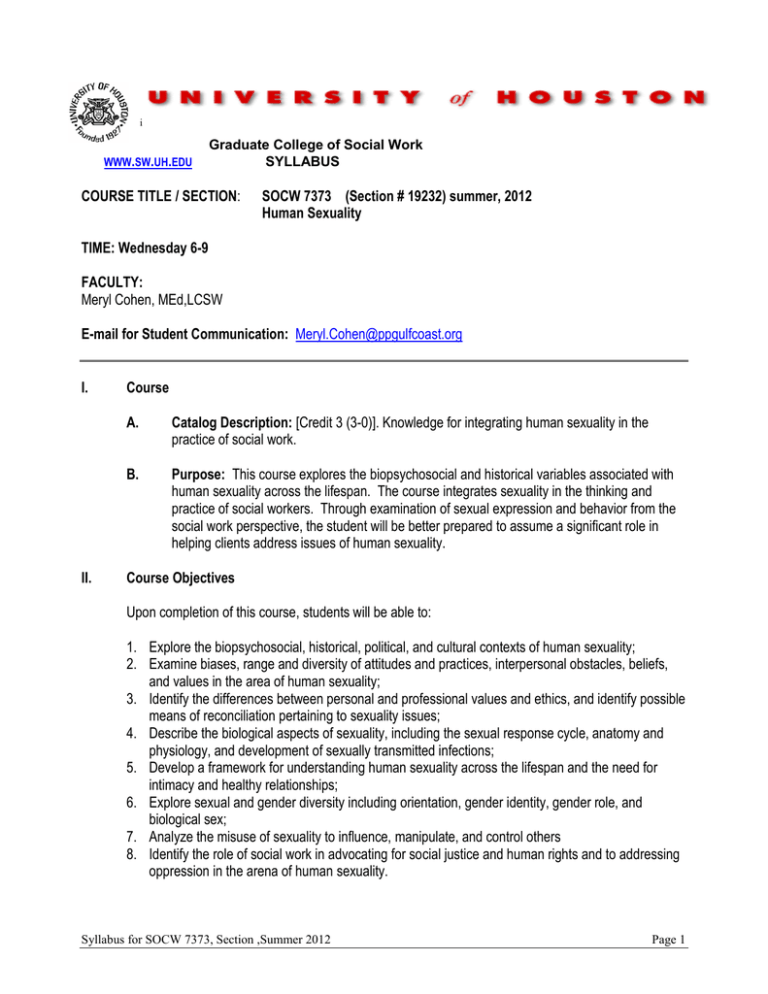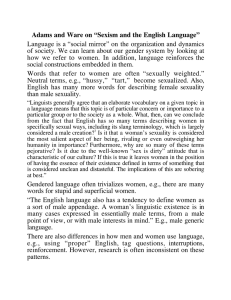
i
WWW.SW.UH.EDU
Graduate College of Social Work
SYLLABUS
COURSE TITLE / SECTION:
SOCW 7373 (Section # 19232) summer, 2012
Human Sexuality
TIME: Wednesday 6-9
FACULTY:
Meryl Cohen, MEd,LCSW
E-mail for Student Communication: Meryl.Cohen@ppgulfcoast.org
I.
II.
Course
A.
Catalog Description: [Credit 3 (3-0)]. Knowledge for integrating human sexuality in the
practice of social work.
B.
Purpose: This course explores the biopsychosocial and historical variables associated with
human sexuality across the lifespan. The course integrates sexuality in the thinking and
practice of social workers. Through examination of sexual expression and behavior from the
social work perspective, the student will be better prepared to assume a significant role in
helping clients address issues of human sexuality.
Course Objectives
Upon completion of this course, students will be able to:
1. Explore the biopsychosocial, historical, political, and cultural contexts of human sexuality;
2. Examine biases, range and diversity of attitudes and practices, interpersonal obstacles, beliefs,
and values in the area of human sexuality;
3. Identify the differences between personal and professional values and ethics, and identify possible
means of reconciliation pertaining to sexuality issues;
4. Describe the biological aspects of sexuality, including the sexual response cycle, anatomy and
physiology, and development of sexually transmitted infections;
5. Develop a framework for understanding human sexuality across the lifespan and the need for
intimacy and healthy relationships;
6. Explore sexual and gender diversity including orientation, gender identity, gender role, and
biological sex;
7. Analyze the misuse of sexuality to influence, manipulate, and control others
8. Identify the role of social work in advocating for social justice and human rights and to addressing
oppression in the arena of human sexuality.
Syllabus for SOCW 7373, Section ,Summer 2012
Page 1
III
Course Structure
This class will utilize several methods of instruction including lectures,
small group exercises, group discussion, guest lectures, video material, role-plays
and/or case studies, self-reflection exercises and the use of individualized readings.
Group and individual presentations and projects will be required.
IV
Course Requirements
Reading Assignments
The course outline contains topics to be covered and reading assignments to be
completed on a weekly basis. Class time will be designed to provide application for
assigned readings. It is critical that students remain current with all reading
assignments and fully participate in class.
Class Attendance & Participation (20%)
Class attendance and participation are critical factors for success in this course and
will be evaluated based on regular and on-time full class attendance and
participation in interactive discussions. Self-awareness of personal sexual learning,
attitudes and values is an important component of this course. Though personal
privacy will be respected, it is expected that through self-reflection exercises,
students will actively assess their personal values and how these values will impact
their professional work and how they can minimize conflict using Social Work
Ethical Principles.
Assignments
Reading Reflection (25%)
Reflection on support reading due weekly 300-500 words submitted in class
6/13, 6/20, 6/27, 7/11, 7/18, 7/25 and on 8/1 reflect on how you are different
since completing the class; Text online http://www.kinseyinstitute.org/ccies;
The readings should compare the USA with one other country in the CCIES
and you may also add other current articles dealing with the issue assigned.
Cite the sections read and article citation. Your writing may include personal
responses to topics from class discussion.
Group Film Assignment (20%)
View a video with sexuality themes (not pornography) and present analysis to
class. The group will present to the class (10 mins.) how the film dealt with
Syllabus for SOCW 7373, Section ,Summer 2012
Page 2
each of the 5 circles in the holistic model of sexuality. Due in class June 27.
Individual Assignment (15%)
Do one thing outside your comfort zone and report in class the experience
(not to include any sexual behavior) (buy a condom, visit an erotic shop, take
a field trip, teach a class, have a conversation, etc). Write 250- 400 words on
your reflections and description of what you did by July 11.
Final Group Assignment (20%)
Twenty to thirty minute presentation with power point and outline identifying
the role of social work in advocating for social justice and human rights and
in addressing oppression within the areas of intimacy, sensuality,
sexualization, sexual identity, or reproductive and sexual health.
Evaluation and Grading
a. Grades will be based on the following:
Attendance and participation 20%
Reflections on readings
25%
Group Film
20%
Individual assignment
15%
Group Presentation
20%
b. Final course letter grades are based on the following standard grading scale for all
courses taught in the College:
A
AB+
B
B-
=
=
=
=
=
96 - 100
92 - 95.9
88 - 91.9
84 - 87.9
80 - 83.9
C+
C
CD
F
=
=
=
=
=
76 - 79.9
72 - 75.9
68 - 71.9
64 - 67.9
Below 64
c. Attendance and Class Participation
Attendance and class participation are considered to be absolutely critical to successful
learning in this course. Maximum participation as demonstrated by regular
attendance of full class period, actively engaging in class discussions, and ongoing
involvement in class work and exercises is crucial to the class participation grade in this
course. Both attendance and class participation will be observed and recorded.
d. Late Assignments
Instructor will allow for submission of late assignments only if the student has made prior
arrangements to do so and for appropriate and compelling reasons. Late assignments
(granted permission for late submission) however will automatically result in the lowering
of the otherwise earned grade.
Syllabus for SOCW 7373, Section ,Summer 2012
Page 3
e. Pagers, Cell Phones, and Laptops
Please show respect and consideration of colleagues and instructor by taking responsibility for
keeping pager and cell phone interruptions to a minimum.
Laptop use will be allowed solely for note taking purposes and those students needing
to do so must make formal written request to the Instructor at the beginning of the
course.
f.
Policy on Grades of Incomplete
Please refer to the UH Graduate and Professional Studies Bulletin for the university policy
regarding a grade of Incomplete (I). Incompletes will be given only in accordance with this
policy.
VI.
Policy on Academic Dishonesty and Plagiarism
Students are expected to demonstrate and maintain a professional standard of writing in all courses,
do one’s own work, give credit for the ideas of others, and provide proper citation of source materials.
Any student who plagiarizes any part of a paper or assignment or engages in any form of academic
dishonesty will receive an “I” for the class with a recommendation that a grade of F be assigned,
subsequent to a College hearing, in accordance with the University policy on academic dishonesty.
Other actions may also be recommended and/or taken by the College to suspend or expel a student
who engages in academic dishonesty.
All papers and written assignments must be fully and properly referenced using APA style format (or
as approved by the Instructor), with credit given to the authors whose ideas you have used. If you are
using direct quotes from a specific author (or authors), you must set the quote in quotation marks or
use an indented quotation form. For all direct quotes, you must include the page number (s) in your
text or references. Any time that you use more than four or five consecutive words taken from another
author, you must clearly indicate that this is a direct quotation. Please consult the current APA manual
for further information.
Academic dishonesty includes using any other person’s work and representing it as your own. This
includes (but is not limited to) using graded papers from students who have previously taken this
course as the basis for your work. It also includes, but is not limited to submitting the same paper to
more than one class. If you have any specific questions about plagiarism or academic dishonesty,
please raise these questions in class or make an appointment to see Instructor. This statement is
consistent with the University Policy on Academic Dishonesty that can be found in your UH Student
Handbook.
VII.
Consultation
Students are encouraged to contact the instructor regarding questions about the course content,
assignments, or any other academic issues related to this course.
VIII.
Americans with Disabilities Statement
Whenever possible, and in accordance with 504/ADA guidelines, the University of Houston will attempt
to provide reasonable academic accommodations to students who request and require them. For
Syllabus for SOCW 7373, Section ,Summer 2012
Page 4
more information and/or assistance, please contact the Center for Students with DisAbilities at 713743-5400. Instructors may not provide accommodations without supporting documentation from the
UH Center for Students with DisAbilities.
IX. COURSE OUTLINE, READINGS, and ASSIGNMENTS
Text http://www.kinseyinstitute.org/ccies
Outline
June 6
Sexuality – Holistic Model
June 13 Biological Component
Assignment due: Reflections from readings section 1, 2
June 20 Sexual Diversity
Assignment due: Reflections from readings section 9,10
June 27 Sexuality through the Lifespan: Childhood Sexuality
Assignments due: Reflections from film and readings 6, 7
Assignment due in class:
Group presentation on film
July 11 Sexuality through the Lifespan: Adolescent Sexuality
Assignments due: Reflections from readings 3, 4, 5
Reflections on individual challenge project
July 18 Sexuality through the Lifespan: Adult Changes and Intimacy
Assignments due: Reflections from readings section 11 plus selected
readings from http://www.thenationalcampaign.org/resources/default.aspx
July 25 Sexualization
Assignments due: Reflections from readings section 8, 12
2 group final presentation
Syllabus for SOCW 7373, Section ,Summer 2012
Page 5
August 1 Final Reports
Assignments due: Final reflection on what has changed for you
6 group presentations
Syllabus for SOCW 7373, Section ,Summer 2012
Page 6



